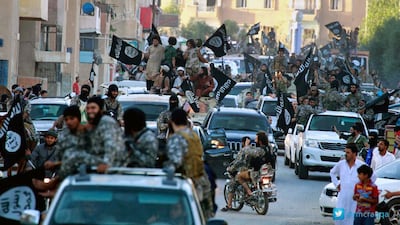There is a worrying conflation of religious adherence and support for politicised Islam, seen as a gateway to extremism, according to a new study on Muslim attitudes in the Middle East.
How They Believe, an in-depth look at Muslim thought and beliefs in five Arab countries by the Arab American Institute, has come up with some contentious findings. These include: a small but worrying percentage of self-described "very religious" respondents – dubbed Formalists in the report – saying they felt that groups like ISIL and al Qaeda are "mostly right" or "correct and follow a right-guided path"; whereas groups of self-described "moderately religious" – dubbed Adapters in the report – almost exclusively held the opposing view.
Presented by Dr James Zogby at a peace forum in Abu Dhabi this week, the report follows up on a survey last year. Dr Zogby chose to focus on the views of those in the UAE, Saudi Arabia, Morocco, Tunisia and Egypt this year.
The survey found no major demographic differences among respondents, but there were pronounced attitudinal differences between Formalists and Adapters.
Formalists largely believe that to be religious it is important to be observant and to adhere to all religious rituals. Whereas Adapters largely believe that to be religious implies living "a moral life" and being "good to others", as opposed to strict adherence to all rituals.
Dr Zogby said: "When respondents were asked if they think that groups espousing a politicised version of Islam should be seen as potential 'gateways' to extremism, we find the majority of Adapters agreeing that these groups are gateways and very strong majorities of Formalists (in some cases, near unanimity) disagreeing with this assertion.
"The strongest agreement that groups that politicise religion lead to extremism is among Adapters in the UAE (69 per cent) and Saudi Arabia (65 per cent). On the other hand, 99 per cent of Formalists in Morocco and Egypt and 95 per cent of such respondents in Tunisia say these groups are not gateways, as do 87 per cent of Formalists in Saudi Arabia and 83 per cent in the UAE."
Mohammed Ahmad, chief executive of Global Needs Foundation, an American non-profit, said the survey showed citizens “don’t have enough education ... to distinguish between what is political and what is religious ... the burden remains on the shoulders of Muslim scholars and the governments in different countries” to address this issue.
Dr Zogby’s report underlined the danger of this conflation of religious adherence with the politicisation of Islam.
"Formalists are far more likely than Adapters to believe that a caliphate would be a positive development. There is near unanimity among Formalists in Egypt and Morocco (98 per cent) that a caliphate would be positive, and very strong positives among Formalists in Tunisia (93 per cent) and Saudi Arabia (87 per cent). A majority of Formalists in the UAE (57 per cent) say a caliphate would be a positive development. Adapters in Morocco (67 per cent), Egypt (62), Saudi Arabia (56), and the UAE (55) say a caliphate would be a negative development," the report said.
Majorities of respondents agree that they either do not consider groups like ISIL or Al Qaeda to be Muslim or regard them as "a misguided perversion of the teachings of Islam".
But, Dr Zogby said, “there are troubling findings when we look more deeply at the data”.
Dr Naved Bakali, an analyst at Tabah Foundation, an anti-extremism think tank, said: “There is some validity to the report ... but it does not paint the full picture.”
He said religious illiteracy was a greater indicator of extremism than adherence.


